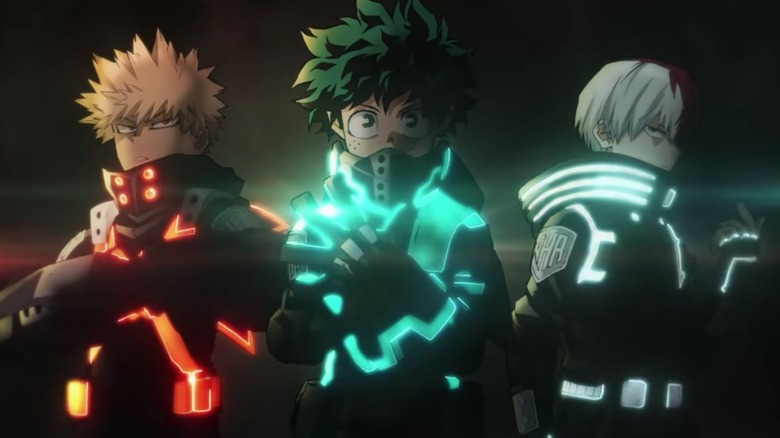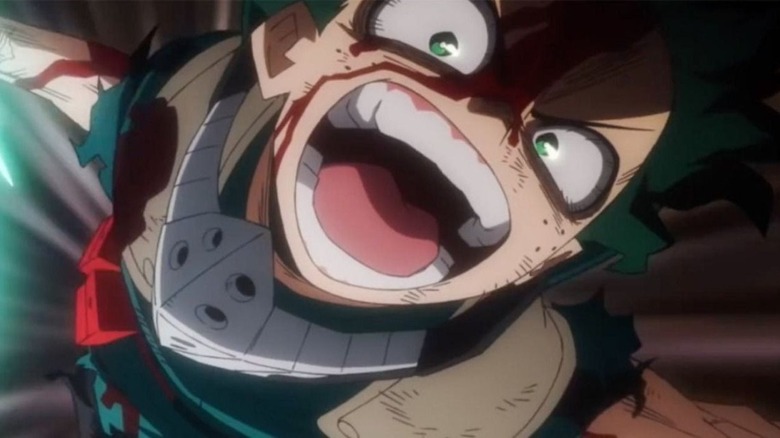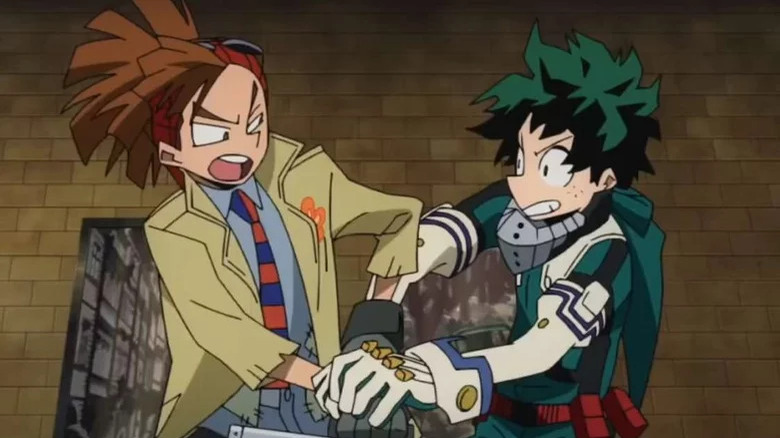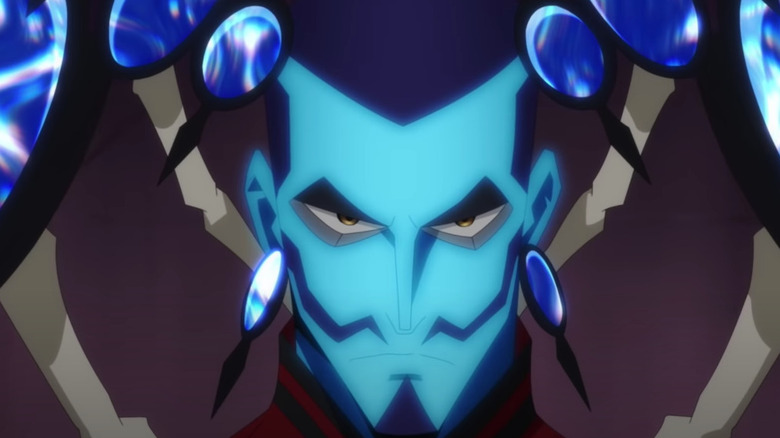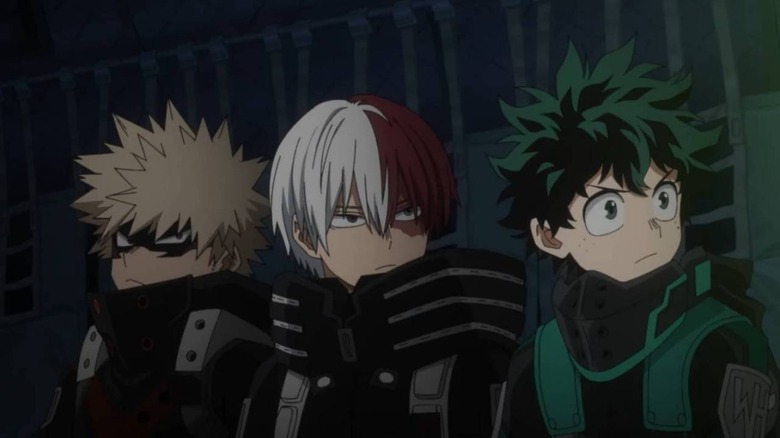My Hero Academia: World Heroes' Mission Review: A Buddy-Buddy Adventure Over An Underbaked Doomsday
The recently-concluded fifth season of "My Hero Academia" superhero anime clawed into the darker implications of its world-building. In the world steeped in Kohei Horikoshi's shonen manga, the majority of humans have superpowers — "Quirks." The deeper "My Hero Academia" delved, the more it reminds its protagonist, a kid of a later Quirk generation, that the emergence of superpowers is still shifting societal and political order to this day. Last we left off in the anime, a faction is recruiting in the thousands to "liberate" their superpowers against government regulation.
That story is for next season. Meanwhile, there could be plenty of experiences Izuku "Deku" Midorya (Daiki Yamashita in Japanese, Justin Briner in English) could gain in the third "My Hero Academia" movie, yet another exclusive side-story not originated from the manga. Penned by the anime's writer Yosuke Kuroda, it's the furthest from a Class A-1 story, unlike the preceding movies, and its premise could well complement the anime's darker descent. But "My Hero Academia: World Heroes" still lacks in scope even when it succeeds with the main character relationships.
Apocalyptic Stakes
A doomsday terrorist faction, lead by the blue-skinned Humarise leader Flect Turn (Kazuya Nakai in Japanese, Robbie Daymond in English), is organizing to decimate the Quirk population. Their cultish gospel is based on the unverified Quirk Doomsday Theory, mentioned in season 4, that believes that interbreeding among superpowered humans may evolve human powers that can overwhelm and destroy humanity. They plant gas bombs — containing the Trigger drug introduced in the anime — worldwide to mass murder Quirked humans and leave behind the "pure" Quirkless individuals in their new world order. (Although their ranks are guarded by lackies with Quirks.)
Deku and his Hero-in-training U.A. High companions, Bakugo (Clifford Chapin in English, Nobuhiko Okamoto in Japanese) and Todoroki (Yuki Kaji in Japanese, David Matranga in English), are stationed at the Europe-based Otheon for their Endeavor Agency internship started in season 5. We're also introduced to Rody Soul, a smirking Otheon street-smart scoundrel in a patched-up trenchcoat accepting a shady gig in a bar in order to raise his two kid siblings in a rundown trailer home. He also has a little pink bird sidekick named Pinto (Megumi Hayashibara in Japanese, Cristina Vee in English). Rody's task: collect a briefcase of stolen jewels in an alleyway. The introduction of Deku and Rody sharply juxtapose their two lives: a chipper superhero dutifully waiting for missions, and a downtrodden civilian cynic trying to make ends meet.
On a chance encounter, Deku ends up chasing Rody and they scramble across the city — the camera inverting and lop-siding the frame to keep up with their mad-dashing, springing, and falling bodies. Hilariously, their chase intersects with another crime scene and Rody ends up with the wrong briefcase. The revelation of the switcharoo explodes into the movie's biggest laughs before danger settles in. It just happens that the briefcase is tied to the Humarise group. Then to the pair's bafflement, the Otheon police and media falsely accuse Deku of murder. Holding the intel to stopping Humarise, Deku and Rody go incognito together to figure how to stop them.
Deku's New Pal
Director Kenji Nagasaki works his usual magic with fluid and eye-catching action, which has a healthy dosage of fist-punching, flying chains and whips, maelstroms of fire, glacial shards, and steroided adversaries. Bones Studio unleashes its expected high-par dynamism, amplifying the cinematic sensibilities. But the true heart is in the emotional connection Deku forges with the new kid.
The middle stretch of the film is a pastoral road trip as Deku and Rody flee the jurisdiction and warm up to each other. They share their life dreams — or lack thereof in Rody's case — under night skies. Their interaction is a minefield of heart and the laughs, owing to their banter and expressive body language. The chemistry between English dub actors, Briner and Levy, strengthens their bond. There are familiar tropes, double-crossings that are the norm in buddy-buddy films, but the decisions that drive them feel rooted in human frailty. A scene where Rody has to call a grouchy informant he's on bad terms with to watch his siblings is very revealing about his desperation.
It's the first time Deku shares onscreen downtime with someone his society would readily shove in the criminal spectrum. Though "World Heroes' Mission" does little overtly novel with Deku's drive to become a Hero, and the audience don't quite feel like this journey radically alters his views of the world order he's sworn to project. But Deku's relationship with Rody shines because of the time shared between them. The camera and the cuts are just as reserved as Rody's own furtive nature as the story tactfully pockets his reactions toward revelations for dramatic bangers. There's also a nifty twist — perhaps an untwist — about Rody's own Quirk status. Twists are often introdued to shock, but this twist is ingenious in that it's there to emphasize how ordinary of a person Rody is, as well as the unspoken language he has forged with Deku.
The Antagonist's Cause
Flect Turn is an interesting contrast to the villainous motives we're used to in the series: He's out to exorcise the world of "diseased" Quirks rather than rid the world of Quirks in a quest for world dominion (not that he doesn't commit the latter).
It's a recipe for compelling world-building and an exploration of paradoxical beliefs. When weighing out the lingering societal aftershock of superhero powers, It makes sense that such a faction would bubble to the surface. But "World Heroes' Mission" tests the boundaries of how we understand the world of "My Hero Academia" without penetrating them. There's not enough covered within its 104-minute running time to truly explore that world.
We learn of the personal angst that fuels Flect Turn's ideology and his disgust of Quirks. Deku and friends square off with Humarise lackeys who joined, not out of belief in the ideology but to save their own butts — Bakugo's deduction about their motives is flimsily taken at face value here. But Humarise as a whole isn't particularly interesting when its only followers in focus are antagonists with self-interested motives. (Season 5 pulled off a more convincing depiction of ordinary masses swayed to an extremist cause). In addition, a generic message shouted righteously against Flect — that you can just get over what comes off as a metaphorical stand-in for a disease or disability by trying hard enough — also adds unfortunate undertones.
The Downside of Side Stories
If you wanted more of a charming Class A-1 story, that's more present in the second film "Two Heroes." Familiar supporting characters play their part across various corners, hitting home how paths have diverged beyond the classroom. The incendiary short-tempered Bakugo (who shows morals to his fighting motives) and the collected Todoroki are not given the spotlight, but they have their chance to shine toward the denouncement.
For casual fans, "World Heroes' Mission" is solid enough in its watchability, crowdpleasing action, sight gags, and core relationship. But for all the wealth of material, there's little substance here. It's the common frustration of side-story movies, just as in "Two Heroes." They aren't the strongest outlet for seismic paradigm shifts for the flagship anime series because they don't want to contradict the status quo.
These movies don't need to treat self-containment as an obstacle; they can reach for solutions that safely contain these stories but still give a sense of change or a satisfactory experience. Like its previous movie, "World Heroes' Mission" caught plenty of lightning in the bottle but loosened the lid because it was uncertain of its own power.
"My Hero Academia: World Heroes' Mission" will have its U.S. premiere on October 29, in English-subtitled Japanese and an English dub.
